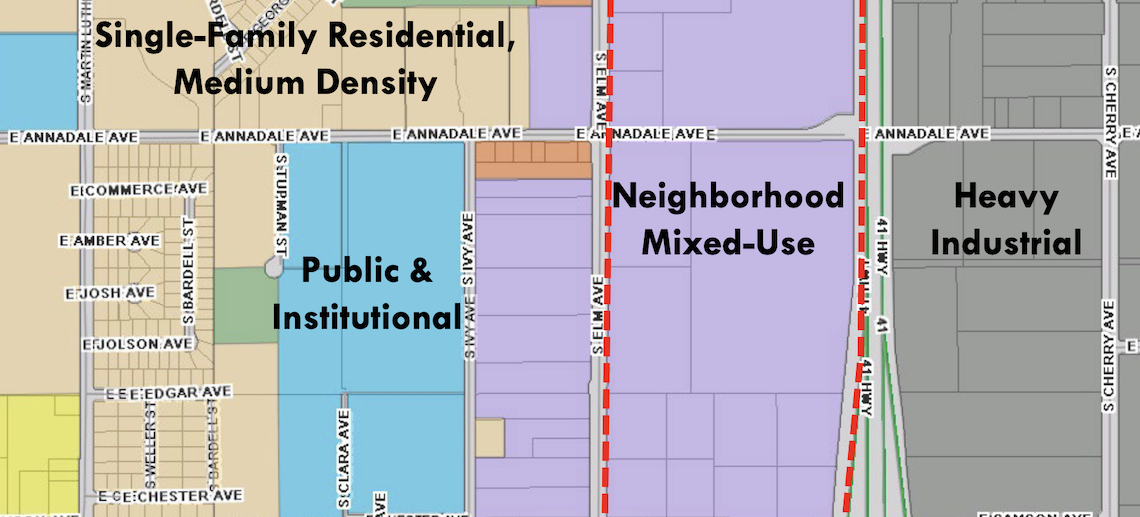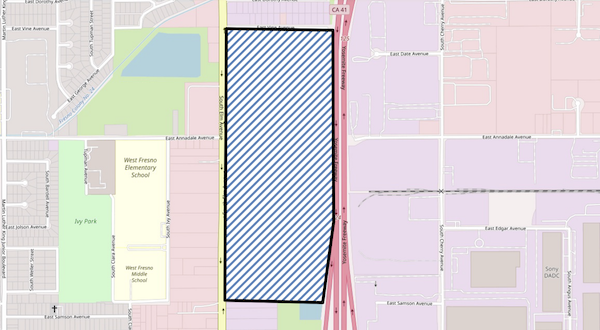
The future of 92 acres of industrial property in Southwest Fresno will be considered with a rezone application Thursday. City of Fresno map
Written by
A controversy years in the making behind reverting 92 acres in Southwest Fresno to industrial use comes to a head Thursday.
That’s when the Fresno City Council will consider that and three other rezone applications.
But while the council member representing the district opposes the 92-acre rezone, he hopes an amendment will satisfy the needs of the community and business owners.
Community leaders say land use changes made in the Southwest Fresno Specific Plan came from a need to reduce pollution in the environmentally burdened area. A reversion would undo years of work to bring change to the oft-neglected part of town, advocates say. But landowners say they were not included in discussions about the plan.
Operating out-of-compliance has made finding new tenants nearly impossible and business owners can’t use their land as collateral to secure loans to make green-energy improvements mandated by the state and city.
Back to the plan
The problem for landowners began when the Southwest Fresno Specific Plan was passed in 2017 changing zoning in many parts of the area from industrial to residential. The fully developed land bordered by Highway 41 and South Elm Avenue houses warehouse users including GlaxoSmithKline as well as MidValley Disposal, the city-contracted waste facility.
Business and landowners were never invited to participate in the process, said John Kinsey, an attorney with Wanger Jones Helsley who is representing the group.
It wasn’t until months after the plan was approved that business owners found out about the change. In 2018, operators with GlaxoSmithKline were looking at doing a tenant improvement when they found out the change, said Kinsey.
Joe Kalpakoff, president and CEO of Mid Valley Disposal, said a letter from the City’s planning department to business owners dated a day after the plan was approved still called the land “industrial.”
‘Out from under them’
The rezone has hindered the business’ ability to operate “significantly,” said Kinsey. He said the value of the property was halved almost overnight.
National tenants don’t want to apply for zoning variances or do environmental reviews.
“It’s not fair to bring people into the City of Fresno, induce them to spend hundreds of millions to construct and then change the zoning out from under them,” Kinsey said.
Industrial users were grandfathered into the zoning, allowing them to operate there but only so long as use doesn’t cease. Once an industrial use stops, landowners have 90 days to find a new tenant otherwise the mixed-use zoning kicks in and an industrial use would be forbidden.
For landlords, finding a new tenant and moving them in in 90 days can’t be done even in a good market, said Kinsey. “In a bad market, that’s impossible,” Kinsey said.
For existing tenants, nonconforming use also means they can’t put up their property as collateral.

Financing roadblock
Regulations from the California Air Resources Board require truck fleets be electric by 2030. To finance that change, loans need to be taken out by companies — with land used as collateral. Banks don’t see non-conforming land as a safe asset.
Kinsey cited a presentation by Dennis Woods, CEO with United Security Bank, who said the loans given to those properties in the past would be unavailable today.
For Mid Valley Disposal, Kalpakoff said in previous interviews that their business is one of constant change, adapting to new environmental regulations. They regularly need to upgrade equipment to stay environmentally friendly.
Enough is enough
Booker Lewis, senior pastor of Rising Star Missionary Baptist Church and now community liaison with the City of Fresno, said in a previous interview that the Southwest Fresno Specific Plan went through a significant vetting process before it was approved.
The 21-member steering committee had been trying to change the planning that has historically put industrial users only in south Fresno.
Community members have complained about odors from the recycling plant, as well as traffic and pollution issues from trucks going in and out of the center.
“For years, the City has planned and still puts industrial — light industrial, heavy industrial — in Southwest Fresno,” Lewis said. “What we’re saying is our area of town has been inundated with this much too long.”
“There’s a reason why research says people in Southwest Fresno live 20 to 29 years less than other people in Fresno,” said Ivanka Saunders, policy advocate with Leadership Council for Justice and Accountability.
Saunders said changing the zoning back to industrial means veering away from the plan before it’s even had a chance to be fully implemented.
Try to work it out
The Planning Commission had sent the application back to staff three times, telling applicants to try to work out issues with community members. The item went back to staff three times in 2021 before the Planning Commission approved sending it before the Council.
Fresno City Councilman Miguel Arias said he plans to deny the request to revert zoning to light industrial.
“I did not feel the rezone of the 92 acres was necessary or appropriate,” Arias said.
Last-minute amendment
What he is going to propose is rezoning a third of the 92 acres to include only land owned by Mid Valley Disposal and GlaxoSmithKline — with nearly a dozen conditions.
Arias said he chose those two businesses because fundamentally “garbage processing is an industrial operation.”
Having garbage operating under neighborhood mixed-use creates a “gray area.”
“We should call it what it is — which is an industrial operation,” Arias said.
Arias said he also chose GlaxoSmithKline because pharmaceutical distribution is an essential service. The other warehouses in the park do not qualify as essential services, Arias said.
Look at the details
Under the amendment, businesses would not be allowed to expand or intensify use.
“If you’re processing 100 pounds of garbage, you can’t process 120 pounds next year,” Arias said.
Future expansion of service would have to go to other parts of the City, he added.
Other light industrial uses not already in operation would not be allowed.
When asked Tuesday about what the proposed amendment would mean for business, both Kinsey and Kalpakoff were surprised by it, saying they had not heard about the proposal.
Arias said he had a meeting planned with applicants Tuesday.
Race against time
Arias said he came up with the amendment because electrifying their truck fleet is beneficial to the City. Arias also said the 90-day limitation is a “legitimate concern” for finding tenants. He said the difficulty comes from the extensive permitting process with the City of Fresno. He said he is working with the administration ahead of Thursday’s meeting to come up with a solution that would help expedite approvals.
“Finding a tenant is the fast part, it’s getting the tenant improvements approved by the City that’s the delay,” Arias said. “That is something the administration is going to have to figure out and resolve, because that’s all controlled by the administration.”
He met with the community to present the draft recommendation Friday. He will take last minute feedback prior to the Thursday vote.








